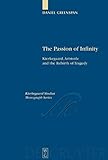The Passion of Infinity : Kierkegaard, Aristotle and the Rebirth of Tragedy / Daniel Greenspan.
Material type: TextSeries: Kierkegaard Studies. Monograph Series ; 19Publisher: Berlin ; Boston : De Gruyter, [2008]Copyright date: ©2008Description: 1 online resource (336 p.)Content type:
TextSeries: Kierkegaard Studies. Monograph Series ; 19Publisher: Berlin ; Boston : De Gruyter, [2008]Copyright date: ©2008Description: 1 online resource (336 p.)Content type: - 9783110203967
- 9783110211177
- 128/.3 22
- B4377 .G7195 2008eb
- online - DeGruyter
- Issued also in print.
| Item type | Current library | Call number | URL | Status | Notes | Barcode | |
|---|---|---|---|---|---|---|---|
 eBook
eBook
|
Biblioteca "Angelicum" Pont. Univ. S.Tommaso d'Aquino Nuvola online | online - DeGruyter (Browse shelf(Opens below)) | Online access | Not for loan (Accesso limitato) | Accesso per gli utenti autorizzati / Access for authorized users | (dgr)9783110211177 |
Frontmatter -- Table of Contents -- Introduction -- Part I Ancient Greece -- Chapter 1. Reason and the Irrational: Sophocles’ -- Oedipus Tyrannus -- Chapter 2. Literature and Moral Psychology: From -- Homer to Sophocles -- Chapter 3. Aristotle’s Poetics: Oedipus and the -- Problem of Tragedy -- Chapter 4. Psuche Redux: Philosophy and the New -- Psychology -- Chapter 5. Psychologizing Oedipus: Reason and -- Unreason in Aristotle’s Ethics -- Part II Golden Age Denmark -- Chapter 6. Tragedy as Historical Idea: Either/Or’s -- “Ancient Drama Reflected in the Modern” -- Chapter 7. Stages on Life’s Way: Hamartia after -- Modernity -- Chapter 8. Fear and Trembling: Tragedy, Comedy and -- the Heroism of Abraham -- Chapter 9. The Concept of Anxiety: Fate and the -- Tragic Logos of Second Ethics -- Chapter 10. Moral Psychology in the Pseudonyms, -- Search for a Method -- Chapter 11. Ethics Contra Ethics: Climacus on -- Eternal Happiness and Tragic Virtue -- Chapter 12. Kierkegaard and the Tragedy of -- Authorship -- Backmatter
restricted access online access with authorization star
http://purl.org/coar/access_right/c_16ec
The Passion of Infinity generates a historical narrative surrounding the concept of the irrational as a threat which rational culture has made a series of attempts to understand and relieve. It begins with a reading of Sophocles' Oedipus as the paradigmatic figure of a reason that, having transgressed its mortal limit, becomes catastrophically reversed. It then moves through Aristotle's ethics, psychology and theory of tragedy, which redefine reason's collapses in moral-psychological rather than religious terms. By changing the way in which the irrational is conceived, and the nature of its relation to reason, Aristotle eliminates the concept of an irrationality which reason cannot in principle dissolve. The book culminates in an extensive reading of Kierkegaard's pseudonyms, who, in a critical retrieval of both Greek tragedy and Aristotle, prescribe their apparently pathological age a paradoxical task: develop a finite form of subjectivity willing to undergo an unthinkable thought - allow the transcendence of a god to enter into the mind as well as the marrow, to make a tragic appearance in which a limit to the immanence of human reason can again be established.
Issued also in print.
Mode of access: Internet via World Wide Web.
In English.
Description based on online resource; title from PDF title page (publisher's Web site, viewed 28. Feb 2023)


